If you’re joining us just now, follow the snake’s tail to the Prologue or climb a ladder to the Table of Contents.
Chapter 16: The Festival
Levi (dressed as the Cowardly Lion) led Evan and Niyati along the Yellow Brick Road through the land that was once called Kansas. From time to time Levi became an actual lion, because in this part of the dream he was also a world-renowned method actor.
As the Tin-Man, Evan was the slowest of the trio because his joints were not very flexible. He made a lot of noise as he walked. But Niyati began lagging behind as well, complaining that the silver slippers weren’t the best footwear for long hikes. She moved the picnic basket from one arm to the other and told Evan she didn’t think it had been a good idea to bring it along, since the only thing in it was Evan’s oil can.
“But have you looked in it lately?” he asked. “There might be a weapon.”
She opened both lids. “Nothing. I don’t think you’re supposed to have a weapon in this part of your dream. We’re in Hell and your moral character is being tested, not your prowess and agility in combat.”
“Fine, give me the goddamned basket and I’ll carry it.”
“No, I’ll keep it. You might lose your balance and fall.”
The Lion waited (couchant) on the road for them to catch up. As they approached, he rose and folded his human arms across his breast.
“We’re here,” he said in a sullen voice.
There was nothing around them. The Yellow Brick Road continued down a hill into a valley.
“So where’s the Festival?” Evan asked.
“The Festival will come to you,” the Cowardly Lion replied. With his right hand he pointed to the corn rows behind Niyati. “We have to spend the night in prayer and atonement in a place of sanctuary—in the Shrine to Lord Shiva.”
Niyati looked curiously at Levi. “I didn’t think night fell in the land that was once called Kansas.”
“Night falls not,” said Levi dramatically, “but the moon rises.” He gestured expansively to a full moon rising over the disc of the sun.
Evan and Niyati stepped through the sere and withered corn. They walked a mile over an evil landscape strewn with blackened corn cobs, scorched snakes, burned and broken ladders, and the skeletal remains of animals and humans.
They came to a clearing where a statue of Lord Shiva stood buried to the waist in the weedy dirt beside a small covered shrine with columns. They climbed the steps and stood together under the high ceiling. Levi held out his hands, inviting them to form a circle with him.
“You’ve never prayed in your life,” Levi whispered to Evan. He was no longer acting. His expression was bland, indignant, sad.
Evan was uncomfortable and changed the subject. “I wish the Scarecrow was here.”
“Why?” Levi asked. “The Scarecrow you met is not righteous. It was a demon.”
“I knew that psycho wasn’t Gordon!” Evan turned to Niyati. “I just knew it.”
Niyati peered over her shoulder, because she could’ve sworn she’d seen the Scarecrow stalking them.
Levi fixed Evan with a cold stare.
“Stop looking at me like that,” Evan said. “Sometimes you creep me out.”
“Why have you never prayed?”
“I wish you’d stop talking about religion,” Evan said. Then he sighed and said offhandedly, “I don’t pray because I wouldn’t know who or what to pray to.”
“That’s arrogance,” the Lion frowned.
“No,” Evan said, “it’s honesty. I can’t trick myself into believing in something I can’t see or touch.”
Niyati put her hand on Evan’s breast. “This entire dream has been something you’ve neither seen nor touched.”
“Exactly,” he said. “And I don’t believe it’s real.”
Levi roared in anguish and paced the shrine. “We shall sleep here.”
Evan grimaced. “Is God going to visit me in my dream?—Or should I say, ‘in my dream within my dream’?”
“Would it matter?” Niyati asked turning away. “You’ve already said you don’t believe the dream is real?”
Levi went to one of the four columns supporting the roof. He curled up on the floor like a lion. Then he became an actual lion and fell asleep.
Evan had never felt so tired. He looked over and saw that, in that instantaneity and immediacy possible only in dreams, Niyati was already asleep in another corner of the shrine, even though they’d been talking only seconds before.
Evan stretched himself out in the middle of the shrine and was soon asleep—even as his slumbering body on the airplane over the Pacific dreamt he was sleeping in a shrine to Lord Shiva in a quadrant of Hell known as the land that was once called Kansas.
The statue of Lord Shiva turned in the dead earth until it faced the crumbling ruin. Behind the shrine the sun hovered on the horizon between early morning and late afternoon.
In his dream Evan recalled what Madame Blavatsky had said to him in Wonderland: “The way to wisdom is to see much and suffer more—to feed your mind with pain.”
“Evan,” Niyati whispered.
He opened his eyes.
She directed his attention to Levi, who was having a nightmare.
“He’s scared,” she said, “because he can no longer hear his mother’s heart. Comfort your friend.”
The Tin-Man went to the Cowardly Lion and sat with his back against the pillar. He drew his friend into his arms and stroked the lion’s mane. Levi seemed to grow calm. But then he woke with a start and jumped up, covering his eyes with human hands. “Oh, God!” he cried. “Please, no!”
“What’s wrong?” Evan asked.
“I’m scared,” he said. “I heard your heart beating.”
“But that comforted you,” Evan replied.
Levi shook his head. “After I heard your heart beat, I heard it break. And now I know what you will see at the Festival.”
The moon was no longer in the sky, which meant it was day. Evan woke up, realizing that he had just dreamt he had been awake, comforting Levi.
The three friends stretched and descended the steps.
“Well, God didn’t come to me in a dream,” Evan said with a smile.
“Don’t be so sure of that,” Niyati remarked. “We often forget our dreams when we awake.”
A globe of light came down from the storm clouds above and resolved itself into the form of Madame Blavatsky. She was dressed like a prairie mother.
“I am Glinda,” she said, “the Good Witch of the West. Now that you have rested, you are ready to attend the Festival. Did you bring your tickets?”
“No!” Niyati exclaimed. “We lost them in the Field of Poppies!”
“They’re in the picnic basket,” Madame Blavatsky replied.
Niyati was relieved that she had not ditched the basket along the wayside. She opened the lid and found two tickets.
“You’ll need your heart,” Glinda rose into the air and waved a willow wand at the statue of Lord Shiva. Out of the statue’s breast emerged the inert singularity that Evan had found on the beach in Sydney. It flew into the Tin-Man’s chest and at that instant, Evan became a man once more.
The Cowardly Lion sprinted into the cornfield.
“Levi!” Evan called out.
Levi looked over his shoulder in fear. Then he ran on all fours in the direction of the Scarecrow who stood holding a shaman’s staff, impaled on a hill in the distance.
Now Evan wondered if the Lion, whom he had comforted in his dream, had been the Lord God in disguise all along.
“That part of the unborn universe that is in me,” Niyati said, “can sense your thoughts again—now that your heart has been restored.”
The demon child Manat, who was disguised as the Wicked Witch of the East, saw in her magic mirror that Evan’s mind had been reunited with his heart. Now was her chance to kill him once and for all. But her exultation was tempered by the realization that there would be many unborn universes at the Festival, so she would not be able to get close to him.
With her magic umbrella she flew up the central shaft of the great tower that had once been a grain silo. And when she reached the top of it the roof was blown away in the tornado that struck the castle. The Wicked Witch of the East flew over the infinite corn maze of the land that was once called Kansas and summoned her servants: “Fly, my pretties! Fly to the Festival in my stead and kill the man called Evan!”
The winged monkeys from the Canadian Colony of Norway flew in the direction Manat pointed to. Like locusts they sped low over the poisoned corn, as the funnel clouds in the distance moved slowly over the cursed land, uprooting the fences, telephone poles and ancient farms that stood in their way. For Armageddon was at hand and the Wicked Witch of the East was its herald.
The shrine and statue of Shiva had vanished and the sound of jubilation could be heard. Evan and Niyati passed through an arch of ossiers and entered the Festival.
Evan wore a doublet of gold trim and yellow brocade. He smiled at Niyati because she looked so beautiful. He was so proud to have her at his side. She was dressed like a Flemish Grundherr’s daughter. She gripped a corsage of wheat and tares and advanced over the green grass that instantly floored the clearing.
The music of drums, lutes and hautboys was heard, even though no performers could be seen. The music was mellow and uplifting, but lacked uniformity and control; and there was something unpleasant about the quarter tones that intruded from time to time, which added an air of menace.
No one asked for tickets. No one seemed to care they had arrived. Twelve villagers danced around a maypole. Their faces were pale and expressionless. Without greeting or looking at the newcomers, they seemed to beckon Evan and Niyati to join them. There was no one else in the clearing. A canvas sail was erected to conceal something, but there was nothing securing its corners. It hovered magically near the maypole.
Niyati tugged at Evan’s sleeve. Then she ran from him, laughingly, and seized a ribbon floating out from the maypole. One of the villagers handed Evan a ribbon as well. He knew the dance as if by instinct and felt unbounded joy—never had he been so happy to be alive. But it was the strangest festival he’d ever been to. There were no booths, no stations, no food, drink. Just the twelve villagers dancing around the maypole.
On the twelfth circuit, he heard the twelve-sided die roll. Then one of the villagers pointed to where the canvas sail fell away. He squinted in the sun; and, as he continued to dance around the maypole, he saw a giant wicker man, the torso of which was a sort of withy cage.
“It lacks a heart,” a villager whispered.
Evan touched his chest.
Niyati was no longer dancing. Evan passed her once and looked at her questioningly. He tried to persuade her to come back to the maypole. But she shook her head and mouthed the word “no.” She dropped the corsage of wheat and tares and grabbed her stomach as if in pain.
He didn’t want to stop but suspected that Niyati, being the selfish bitch that she was, would be upset if he didn’t ask what was wrong. He apologized to the villagers one by one, but none acknowledged what he said—and that upset him more than Niyati’s decision to sit out the dance.
“Why are you acting this way?” he asked angrily, pulling her aside by the elbow.
“I know why we’re here,” Niyati said. Two tears rolled down her cheeks. She led Evan to a cemetery in the shadow of the wicker man. There were weed-choked headstones everywhere.
“What are these?—Who’s buried here?”
The music stopped. The dancers dropped the ribbons. They turned to face Niyati and Evan. A gentle wind blew over the poisoned corn.
“It’s an Infertility Festival,” Niyati said. “These are the sons and daughters, the generations you might have produced, but never will.”
His face blanched. The rolling thunder echoed over the infinite corn maze from one end of the land that was once called Kansas to the other.
“What?” he asked, breathlessly. “What does that mean?—What are you saying?”
Without waiting for an answer, he ran to the first headstone. There was a man’s face carved on it, but the name was scratched out:
3 November 2053–5 August 2120
In memory of a dear friend and loving father
“It’s my great grandson!”
The next headstone belonged to his daughter, whose name would have been Parvati. The death date was illegible, but the birthdate was 2 July 1996.
“Evan?!” Niyati cried.
He ran from grave to grave, reading aloud any words he could make out. His voice cracked in panic. The edges of his eyes became mauve as he descended into a state of manic rage.
“It’s your fault!” he shouted.
Niyati drew herself up in indignation. “Don’t you dare blame me for this,” she hissed. But in her eyes there was a nervousness that made Evan suspect she was admitting to some kind of responsibility.
He ripped at his collar because he was hyperventilating. He continued to stagger through the cemetery.
That was when the unborn universes appeared. They rose out of the earth, one beneath each grave. And Evan saw there were more headstones—hundreds!—farther off in the corn. The inert singularities floated overhead as Evan tore his hair and moaned. Those unborn hopes—the consolation of his old age—all those possibilities that would never be, were abandoning their sire. They moved in clusters toward the wicker man, entering its cage-like chest, where they coalesced and melded into a single glowing heart that began to beat.
The Good Witch Glinda floated over the scene, observing how Evan would face this, his greatest trial. Between the crackling thunder and the anguished roar of the Cowardly Lion, Evan glared up at her. Then he shouted as loudly as his burning lungs would permit, “Why would you give me back my heart only to take it away from me again!”
His knees gave out. He fell backwards onto a grave. Then the inert singularity that had bonded with him on the beach in Sydney rose up out of his ribcage and shot up hundreds of feet over the Festival.
All at once, the winged monkeys from the Canadian Colony of Norway swooped down. One of the chimpanzees snatched up Evan’s heart and flew across the corn maze. The others followed.
The wicker man’s chest caught fire as its head sprouted horns. The sacrifice of the unborn innocents had transformed it into the devil Moloch.
Over the Pacific Ocean, Evan’s sleeping body went into cardiac arrest. But the cabin lights were doused. No one noticed him convulsing in his seat. Although his heart had left him, Evan still heard it beating. Everything was as it had been in the beginning of the dream when he felt as if he were underwater. He realized that his back was broken in the dream, but that it was merely arched on the plane. His eyesight, as he lay supine on the grave in the cornfield, grew blurry. He tried to force himself to wake up—and his eyes could make out the dim cabin lights. But then his heart stopped, his chin fell forward; and the college boy from UCLA was dead at the back of the plane.
Manat bared her fangs as the winged monkeys approached.
“Fly to my lair, my pretties!” she shouted. A wormhole opened in the black clouds, disclosing another dimension. “Take his heart to the Shattered City and there await my orders!”
Into the wormhole the winged monkeys plunged; and when the last of them was through, the aperture contracted and the wormhole was gone.
Manat exhaled in relief. Her nemesis was dead. She had won the game! She transferred a part of her psyche into the wicker skull of the devil Moloch; and even though the diminutive witch stood motionless under her magic umbrella on the far side of the infinite corn maze in the land that was once called Kansas, Manat was able to gaze downward on the scene of the Festival through Moloch’s flaming eyes.
“The game is over,” Moloch-Manat bellowed. “Destiny has triumphed!”
There was a low hum as four of the powder-blue aliens of the desert planet of Satcitananda appeared at the edge of the corn rows. Time stopped in the dream for all but the Satcitanandans, Niyati, Madame Blavatsky, Moloch-Manat, and the newcomer who emerged from the shadows in the cornfield: the Havasupai man who runs the gas station on the Astral Plane. He stepped into the Festival’s grassy clearing—but though he stood in the clearing, he seemed a mirage in the distance.
Madame Blavatsky landed in front of the maypole, where the ribbons stood poised in the time-locked wind.
“It is a disaster!” she said. “The child Evan is dead!—We misread him! We never knew that the only hope he cherished in his heart, the one thing he wanted more than anything else in the world, was that his sons and daughters would live and flourish after he was gone.”
Niyati joined them. Moloch-Manat shifted from one foot to the other.
Madame Blavatsky turned to Niyati. “Where is the child Niyati?”
“She has fainted away in horror—in both his dream and her own. It is I, the unborn universe, that speaks through her astral form.”
The Wicked Witch of the East bared her fangs as she stood under the umbrella—millions of light years away on the other side of the infinite corn maze in the land that was once called Kansas. She loathed unborn universes because she had no power over them; and this one was the worst of all.
Moloch-Manat (the quondam wicker man) swaggered triumphantly over the field, but the Wicked Witch suspected her adversaries were attempting to outmaneuver her.
The Havasupai man spoke: “A new universe can be brought forth only out of pain and suffering. The child Evan has lost the game.”
“He was only a man!” the unborn universe exclaimed.
“I’ve heard that one before,” the Havasupai man said. He smoked his cigarette, unimpressed.
Madame Blavatsky persisted: “How is it that he could doubt everything that preceded this part of the dream, but here he believed that this outcome was immutable? It was only a warning of what might be!”
The Havasupai pointed to the astral form of Niyati. “On the Golden Path you revealed your nature. It took him awhile to believe in the dream. But when he did, it was here at the Festival. And what you taught him on the Path led him to the conclusion that this was his destiny.”
The unborn universe in the astral form of Niyati clasped her hands together, pleadingly. “Give us one more chance!”
Manat knew how easy it would be for her adversaries to turn back time. She sensed that Madame Blavatsky and the unborn universe were close to persuading the Havasupai man to let that happen—and if it happened, they would try to steal Evan’s heart away from her. But his heart was her property.
Moloch-Manat spoke: “What the gods do cannot be undone!”
“She’s right.” the Havasupai man said. “It is the iron law of Necessity. Manat has wrested Evan’s heart from him. It cannot be taken from her except by force.”
The Wicked Witch of the East grinned.
“That can’t be true!” Madame Blavatsky replied. “I was born a mortal on the planet Earth where the sun rises in the West. Yet my astral form broke Manat’s spell, and I was free again.” She looked at the burning wicker man. “If what the gods do cannot be undone, how was I, a mere mortal, able to do that?”
“Your success neither contradicts nor violates the law,” the Havasupai man said. “Manat failed to keep you under her control—this is the deed that remains undone.”
The child witch frowned; her black eyes darted left and right. And the burning eyes of Moloch-Manat darted left and right as well.
“Let us try again!” the unborn singularity said. Tears welled in Niyati’s eyes.
“What do you propose?” the Havasupai man asked.
Madame Blavatsky turned to the mirage of the Havasupai man, which was no longer in the clearing but standing far away in the cornfield: “I am the most powerful dreamcatcher that scours the Astral Plane,” she said. “Allow me to steal the sequence of events from the point when Evan and Niyati left the Field of Poppies until the Festival. Neither of the two shall recall anything that took place in the land that was once called Kansas. But they will remember that they lost their memory.”
“The child Evan must still be tested,” the Havasupai man said.
“Agreed!” Madame Blavatsky said.
“But not in this way,” the unborn universe pled.
“Then it shall be in a way of my choosing,” the Havasupai man said. “And there will be conditions.” He turned to Niyati. He was again standing in the grassy clearing. “You are forbidden to tell him what you are as you did on the Golden Path; and this will sow doubt in his mind and he will wonder if you—and she—are truly on his side. . . And one more thing,” he said as he faded away in both the clearing and in the distance. “Manat gets to keep Evan’s heart until he finds the balls to retrieve it himself.”
Manat had no say in the matter. The Master of all dreamers who transit the Astral Plane had spoken. She knew that in order to advance to the next square on the game board, she would have to die in this part of the dream—and die now, before Madame Blavatsky stole the dream away. So she disengaged her psyche from the devil Moloch.
Casting her umbrella aside, she lifted her face to the storm clouds; and the rain fell in sheets. The witch’s skin seared, hissed, and blistered as the flesh rose in flaps and flew off the child’s bones. The sound of a thousand cackling hyenas rent the sky, as an obliterating tornado passed through the coils of ash that was all that remained of her astral form. The magic umbrella tumbled about before becoming lost in the howling winds.
Madame Blavatsky, in the guise of the Good Witch Glinda, flew up in the air and seized the devil Moloch by one horn. She lifted him high over the infinite corn maze. And as she did this, the dream got stuck to Moloch’s heels and was dragged up with him. It was as if a stage magician had seized a table cloth and pulled it away rapidly; but instead of the dishes, the flatware, and the flickering candelabra remaining fixed in place, these items became featherlight and stuck to the cloth, as the table (and the theater curtains and the footlights) were rolled up into it as well, until the miraculous fabric sucked the astonished spectators out of their seats, and left the magician alone in the empty theater.
The Mother of Theosophy grew smaller and smaller the farther up she flew, as an expanding vortex formed out of the skirts of her train. She towed behind her the entirety of the unbounded dreamscape of the land that was once called Kansas: the infinite corn maze, the Golden Path, the tornados, the towns, the telegraph poles, the dead astral form of Evan (a worthless husk now), the Cowardly Lion, and the Scarecrow. The twelve ghostly townsfolk flew up into the vacuum, along with the maypole and its ribbons. And as the flapping fringes of the dream fabric fanned the blustery air, those accursed pages of this part of Evan’s story (torn from the Book of Life) fluttered in the wake of the vanishing dream, like the wind-swiveled leaves of autumn.
But the dream had to go somewhere, and what better place for it to go than into the dimensionless well of Maya? There it landed in a stream that became a wooden vat, where the Provençal virgins who inspired the lays of the wandering minstrels of yore trammeled on the dream-cloth to purify it—until it morphed into the must of the gods’ sacred wine, whose ripe grapes empurpled the ankles of the virgins, who labored as they laughed and sang of the coming Festival of Infertility, where a man named Evan would lose his heart and life—only to be reborn that he might dream of forgetting that he had once dreamed he had forgot about what he had lost in the land that was once called Kansas.
The Havasupai man stood on the airplane over Evan’s body and watched with an expression that wavered between curiosity and impatience, as one of the Satcitanandans wriggled its fingers and cast a wall of temporal retrogression that passed through Evan’s body and grew in force and magnitude as it pervaded the vacuum and extradimensional interstices of the known universe.
The inert singularity in the pocket of Evan’s salmon-pink Bermudas trembled in the meshes of the wad of lint as it endeavored to maintain all the complicated interlinkages that bound Evan’s friends and acquaintances to this cosmically important dream.
The clocks rolled back an hour; and the Havasupai man took a long drag of his cigarette and exhaled a cloud of smoke that became the Ruach Adonai and entered Evan’s mouth and nostrils.
He dreamed he was a newborn being bathed by his mother in the kitchen sink. His curious eyes were drawn to the water droplets falling from the tap. He watched each one hit the water’s surface: drip, drip, drip. He pointed and smiled; and looked at mama to see if she, too, had noticed the up-splashed blossoms where the wet kissed the wet.
As each droplet fell it formed billions of slender threads of glass that shot upwards and outwards, interweaving a web of glass across the Astral Plane. Each thread divided and subdivided, then split into millions, then billions of millions—until all of the astral forms in the universe crawled like spiders over the fragile threads of web of glass.
Then Evan heard Madame Blavatsky’s voice whispering to others whom he could not see: “His brain has spun the dream anew.”




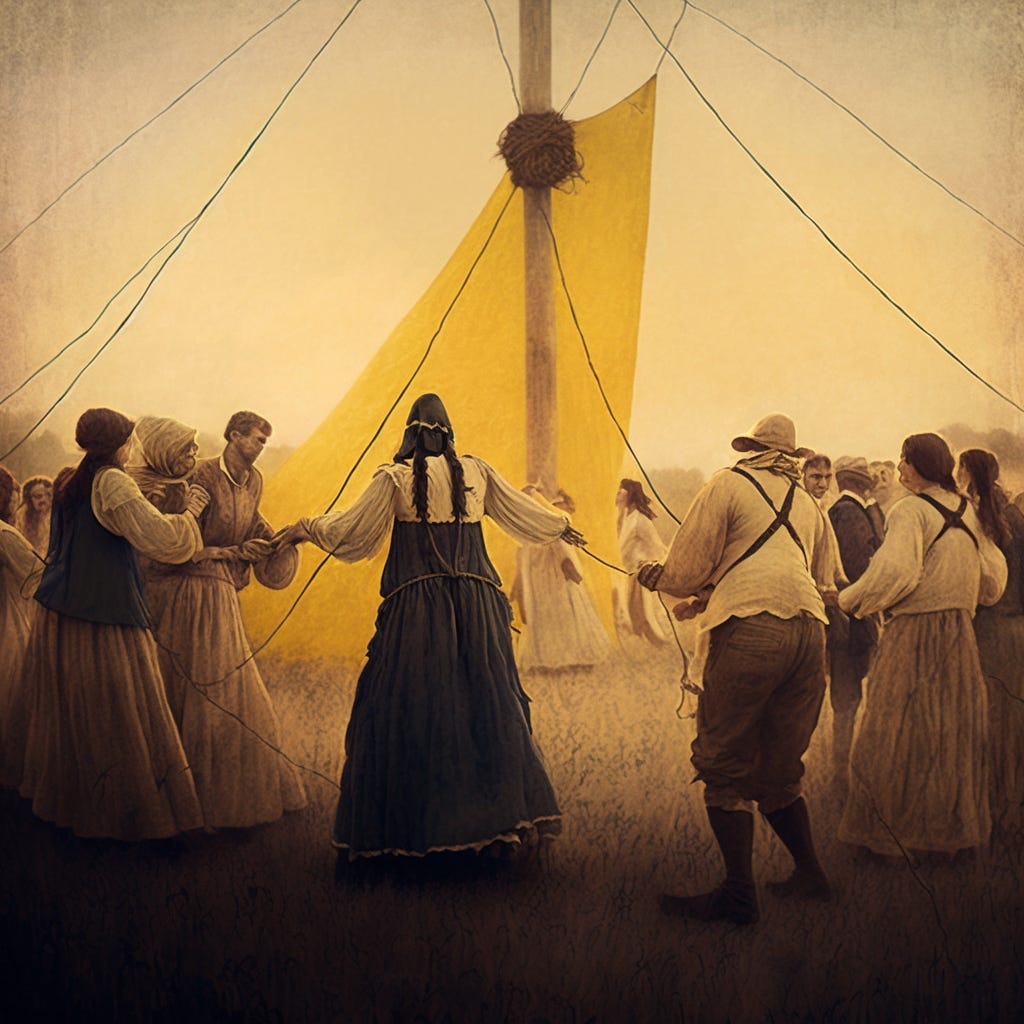
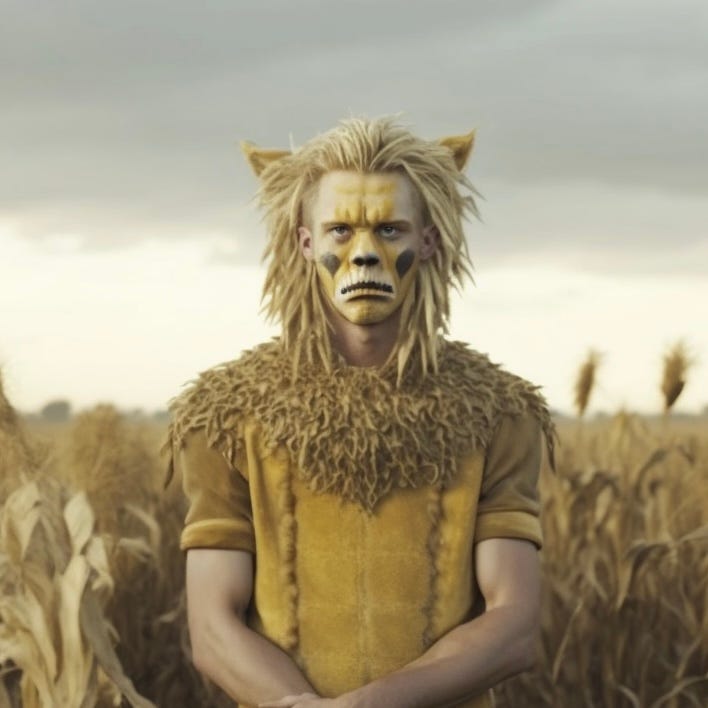
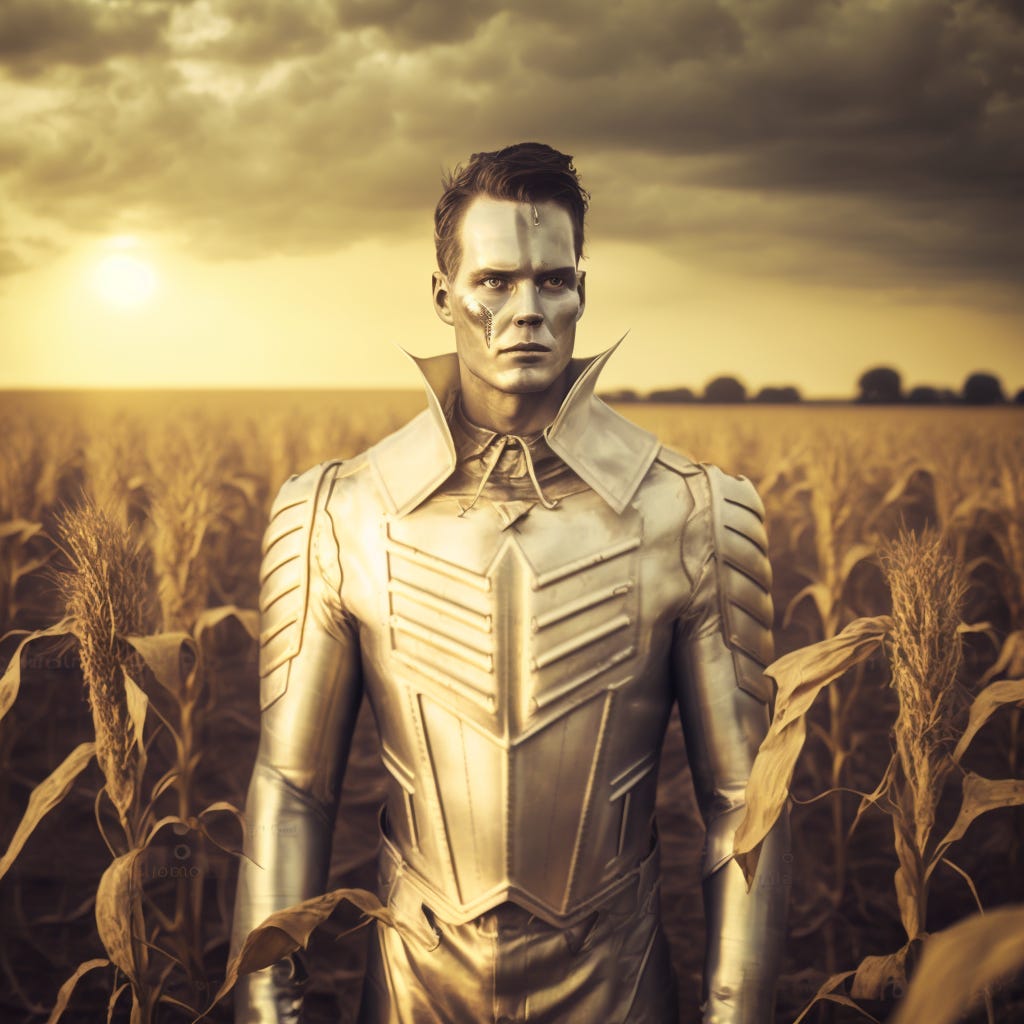

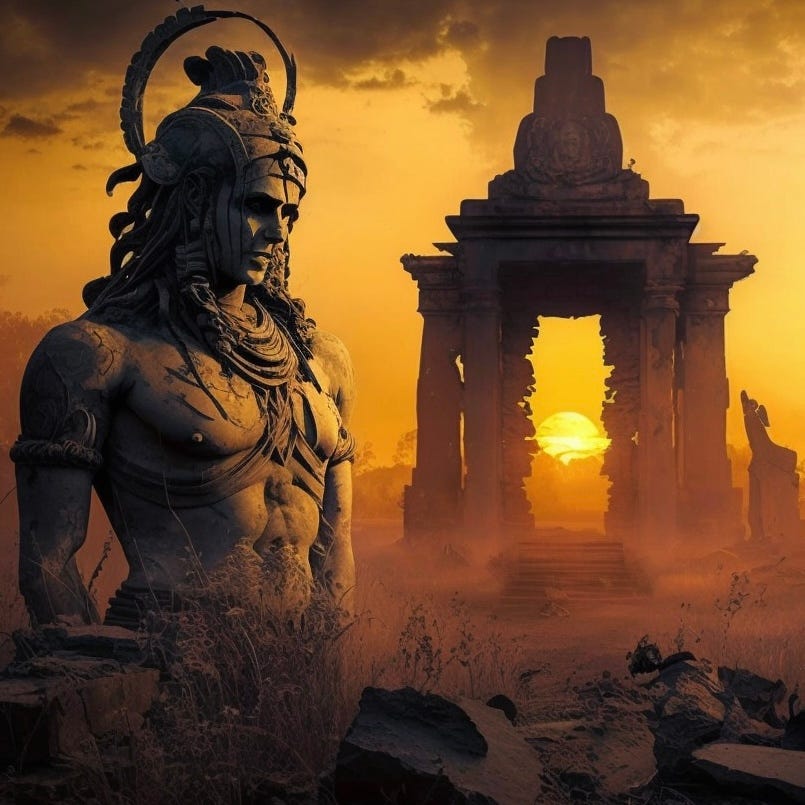

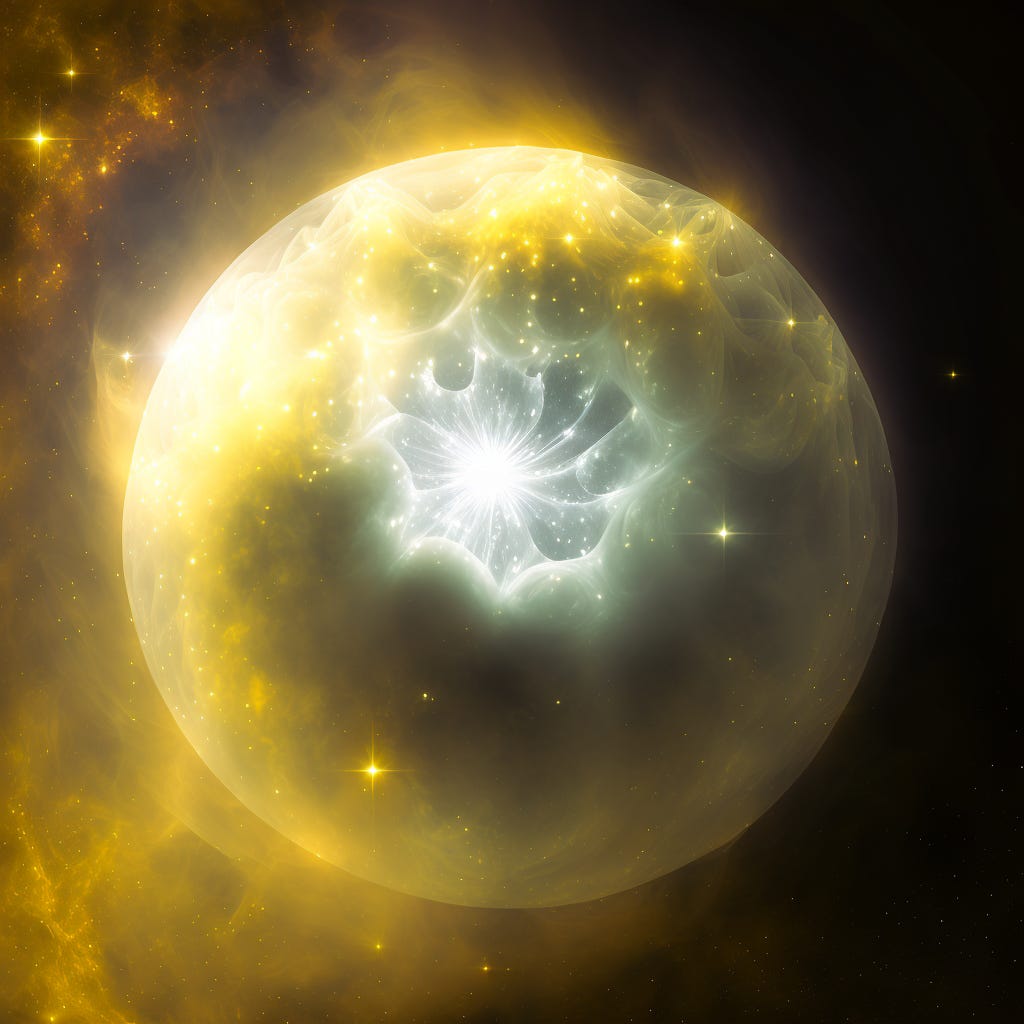
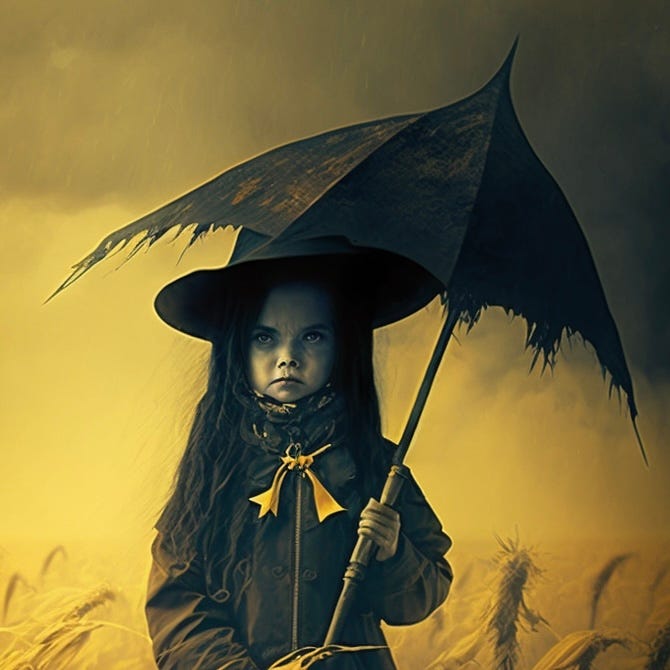
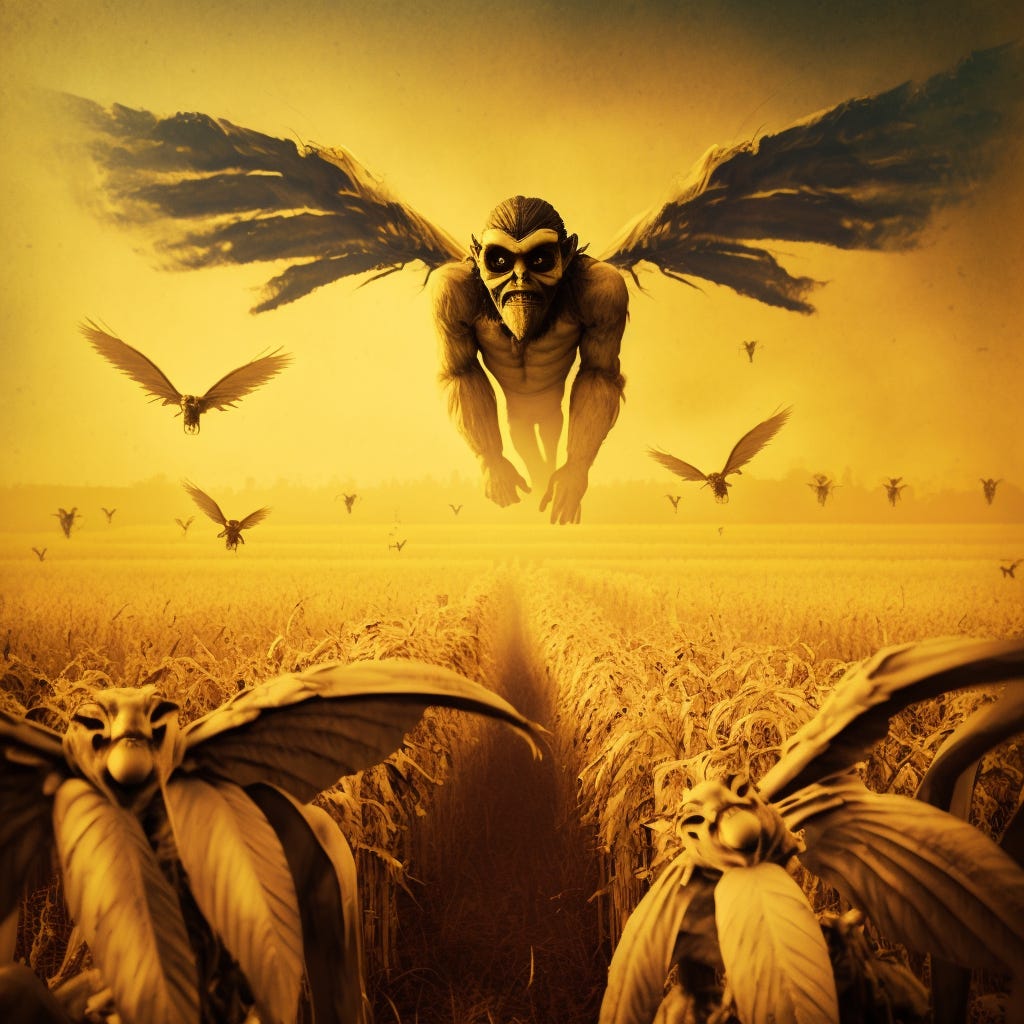
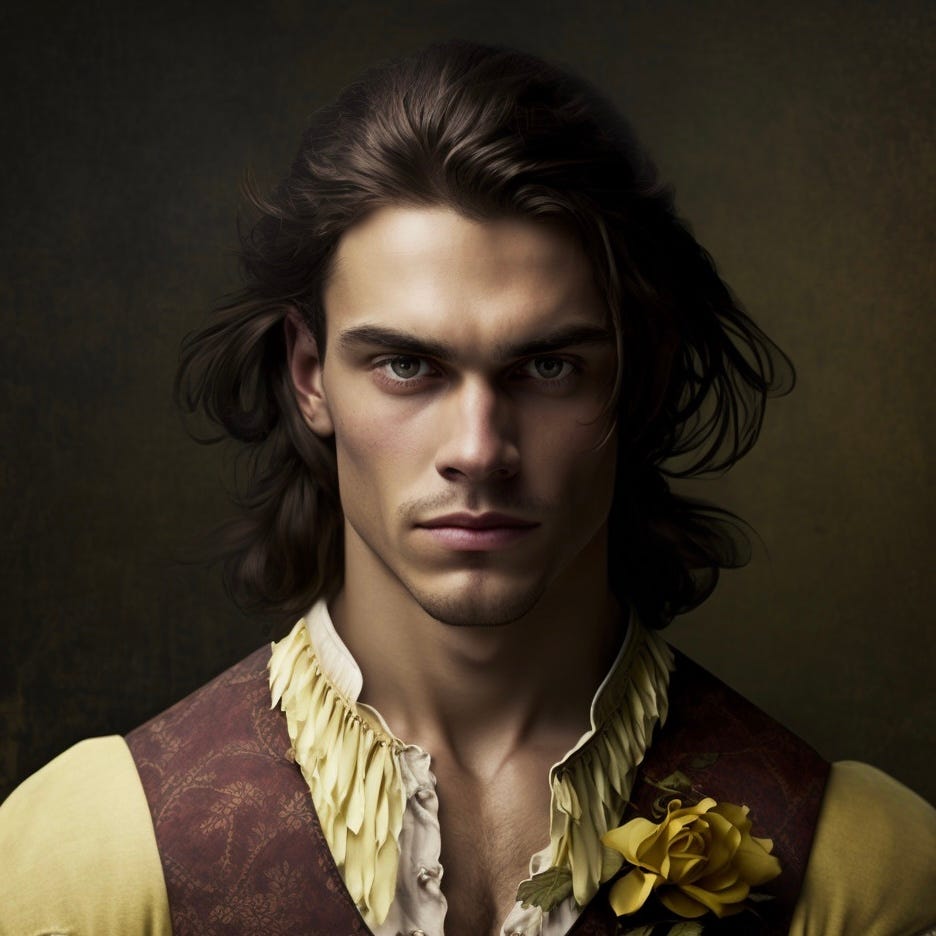

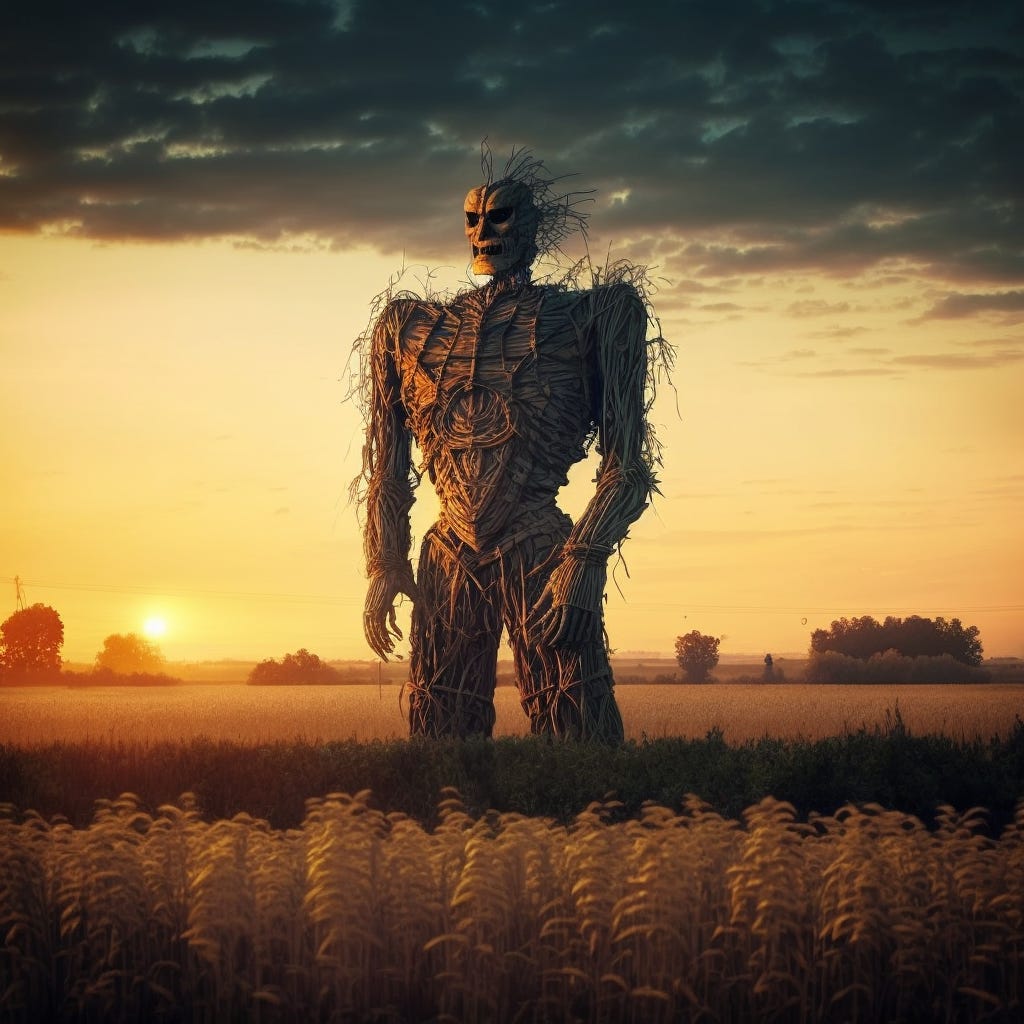
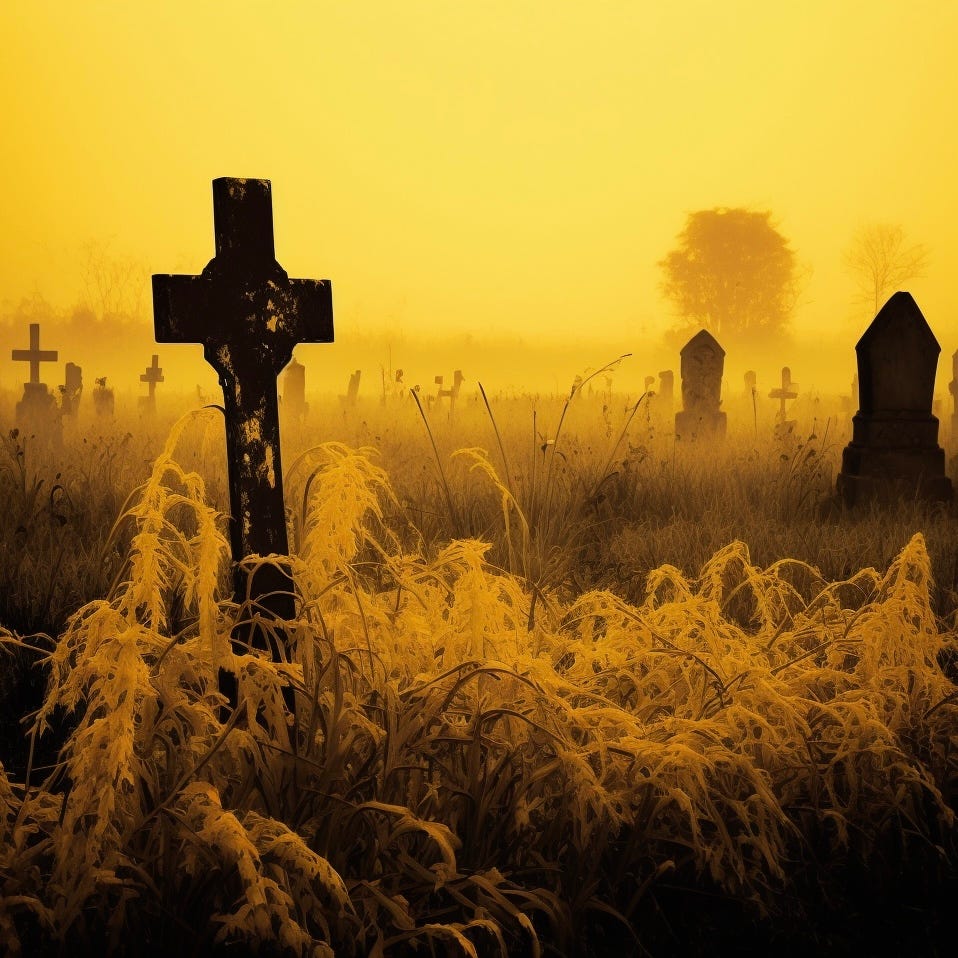
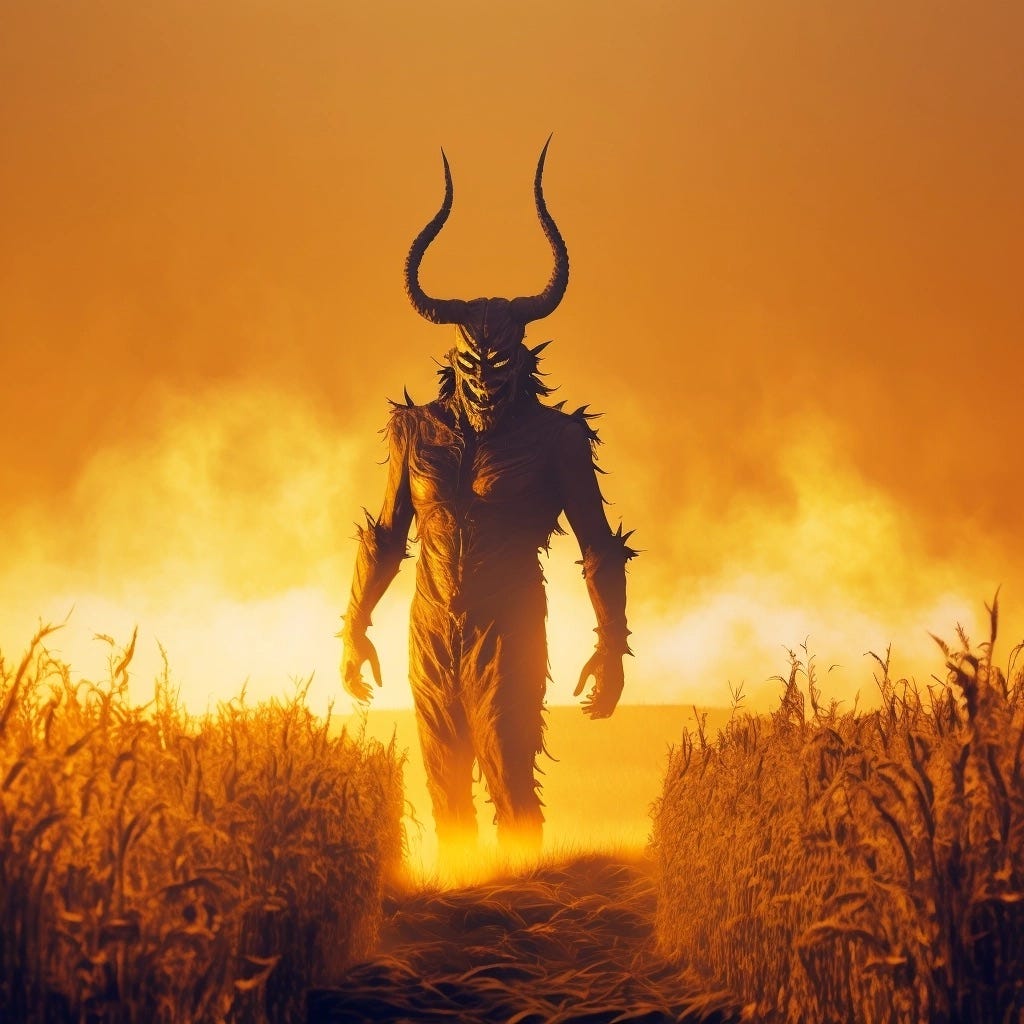
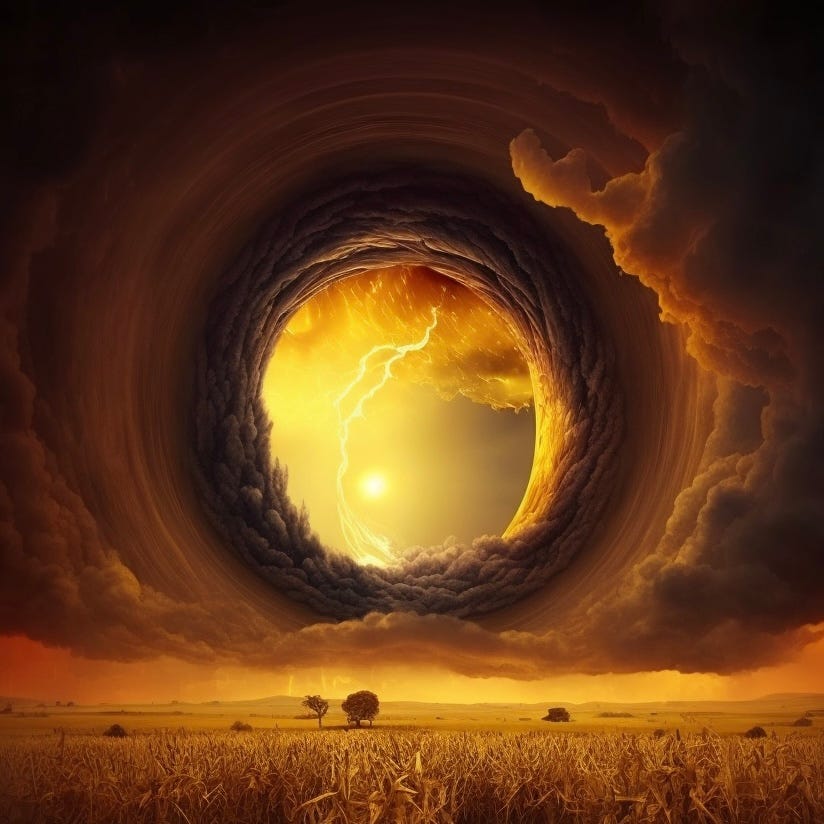
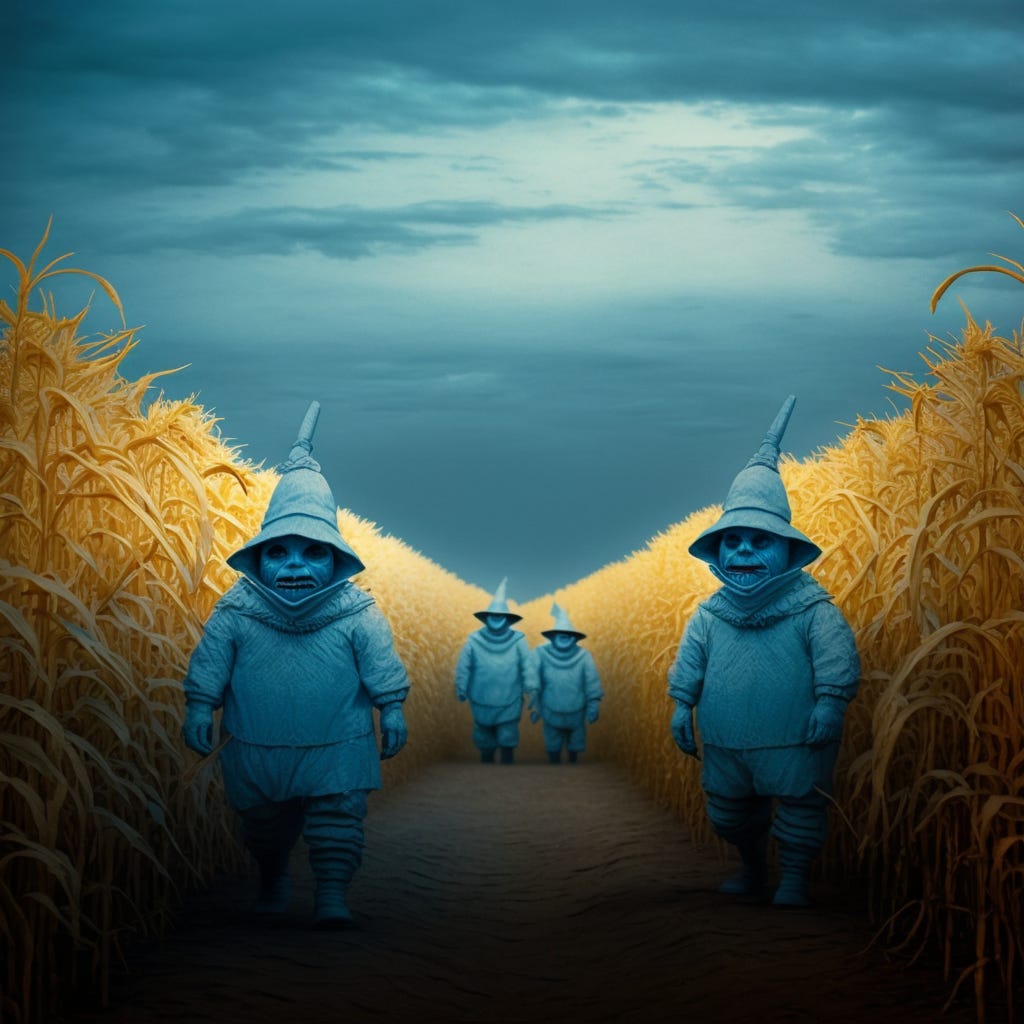
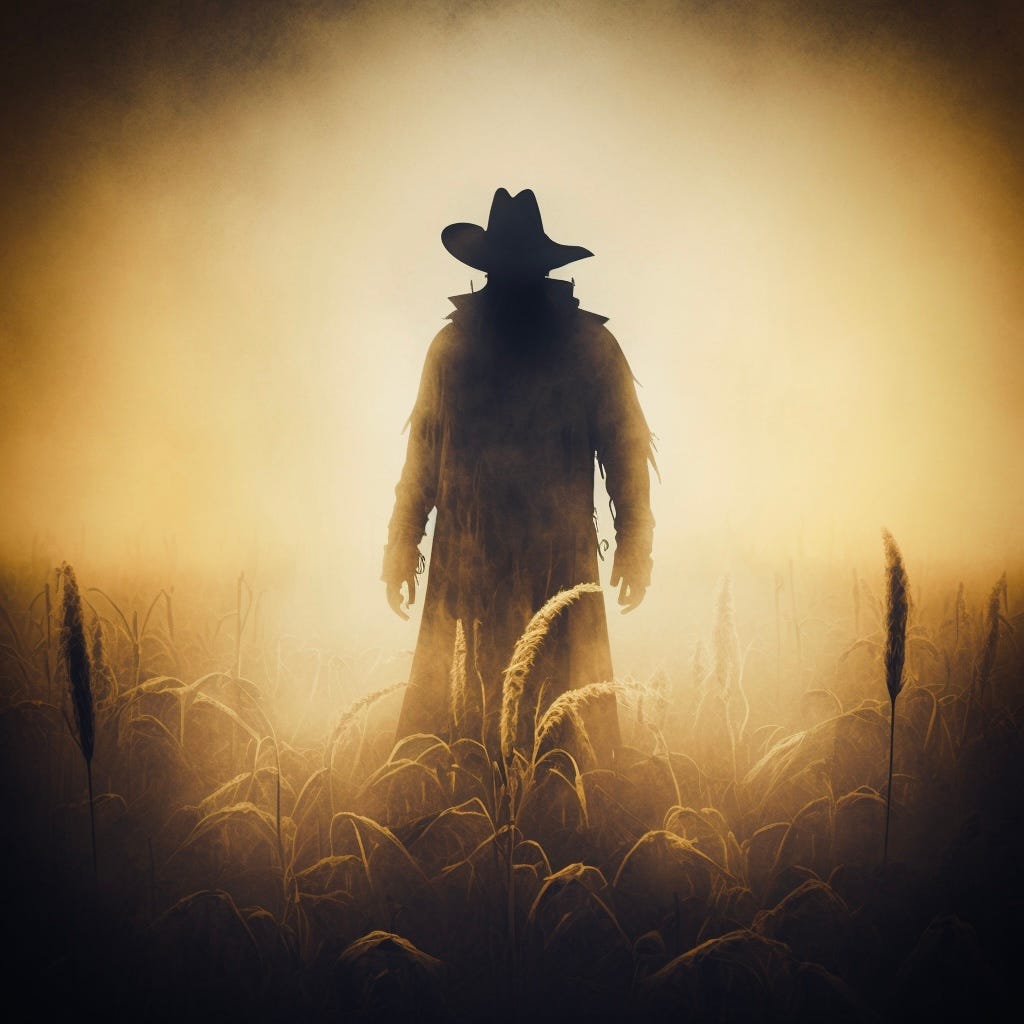
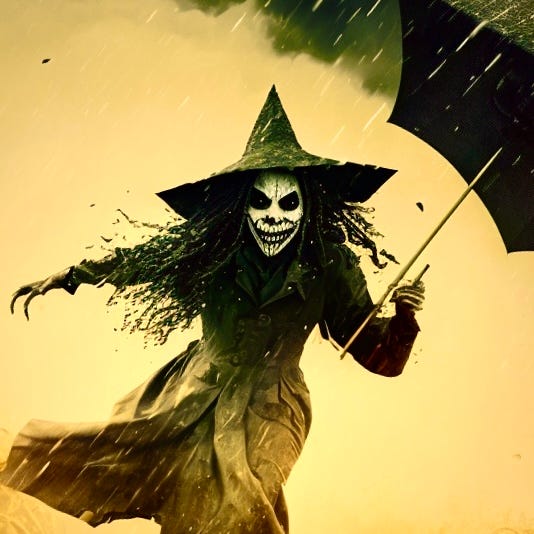
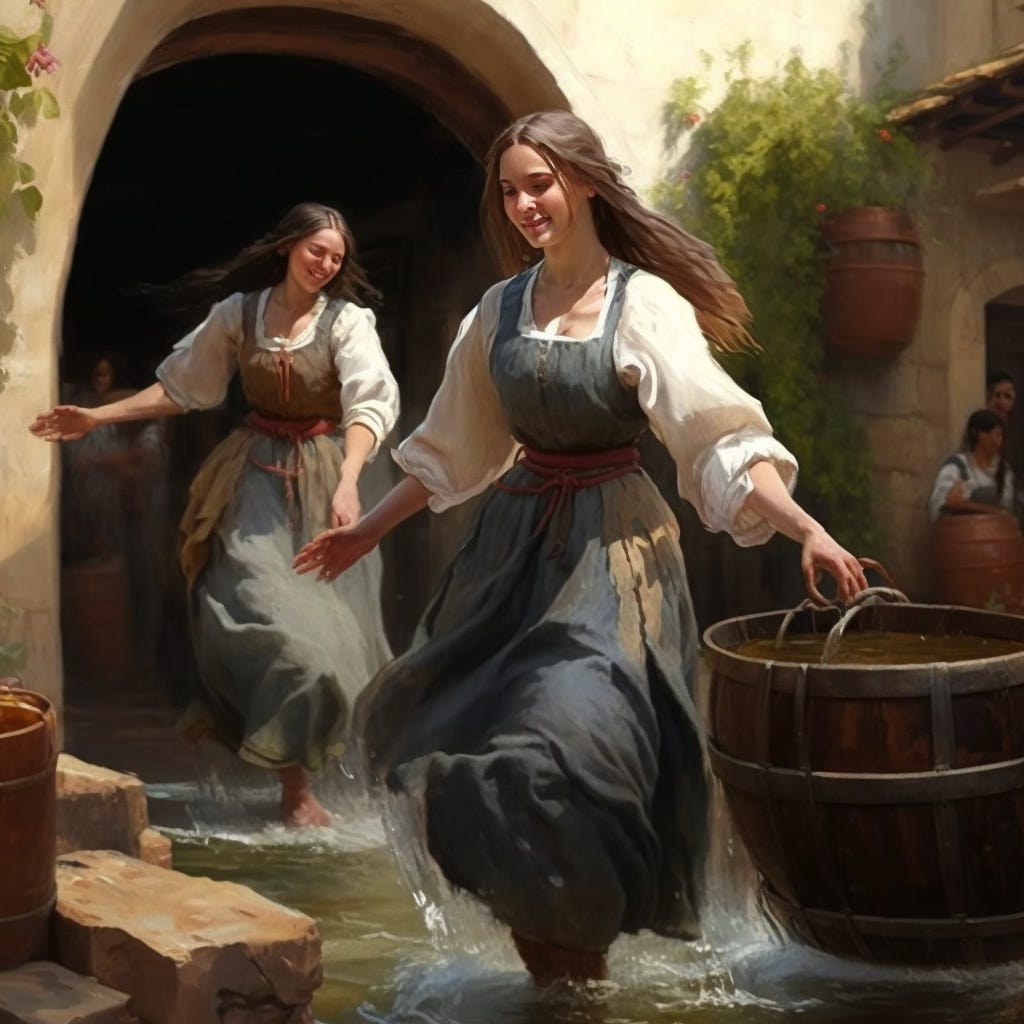

‘They walked a mile over an evil landscape, strewn with blackened corn cobs, scorched snakes, burned and broken ladders, and the skeletal remains of animals and humans.’ 🙌🏻
But then, by great fortune, we all discovered Substack.
Those old horrors! Can’t put my finger on it. Watched one called ‘Superstition’ about a witch and literally didn’t sleep for two nights. Very unspecial effects and corny storyline in hindsight but got right into my mythic brain.
"he was sleeping in a shrine to Lord Shiva in a quadrant of Hell known as the land that was once called Kansas."
That's just too good an image not to savor :-) The tension between Niyati and Evan in the graveyard leaves some interesting questions lingering after this harrowing chapter (unless I missed something earlier?) And, of course, I have to appreciate a Wicker Man. I've never been able to wrap my head around exactly how the original Celtic version would have worked from an engineering perspective, but I am a fan of all the film versions since. Such a bizarre way to dispatch sacrifices... But I do wonder if, rather than being a creative cage, filling it with various specimens of living beings is a way to "quicken" the frankensteined, godlike figure before immolating it? Which makes your version especially poignant.
Also, a couple of minor catches maybe, since you asked:
The demon child Manat, who was disguise[d]?
Then the inert singularity that had bonded with [him?] on the beach